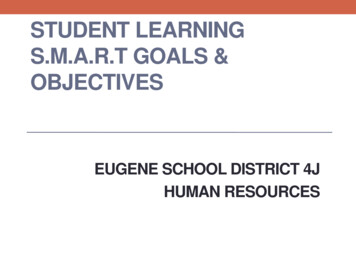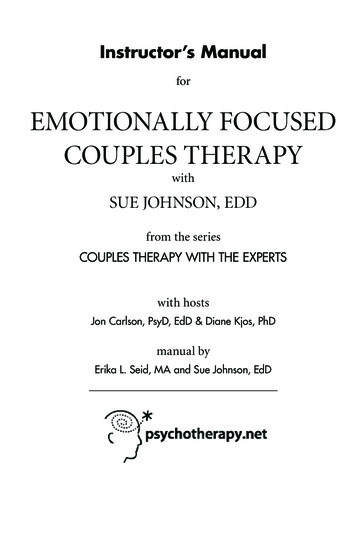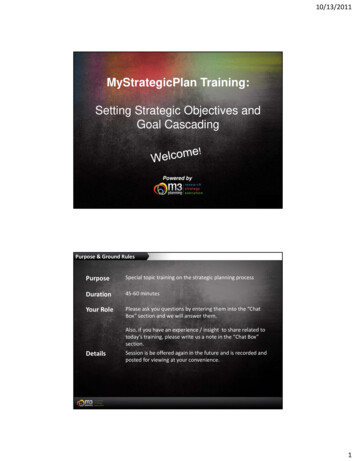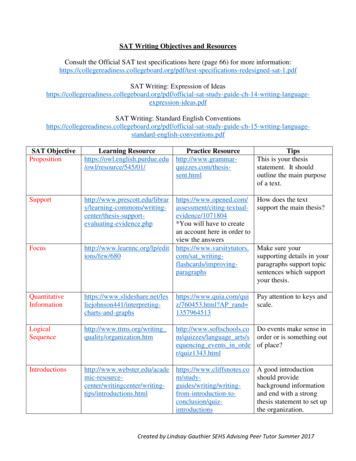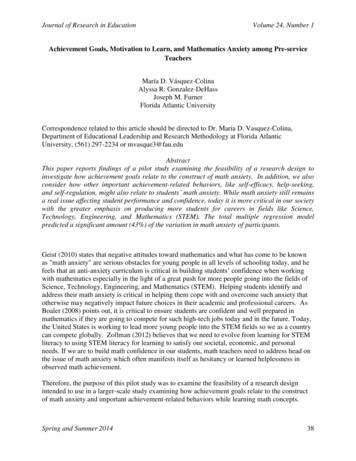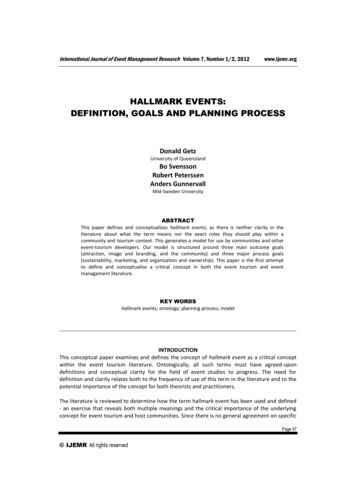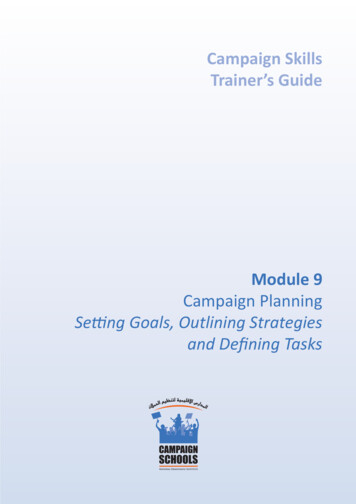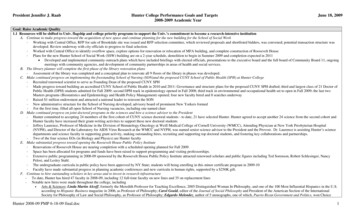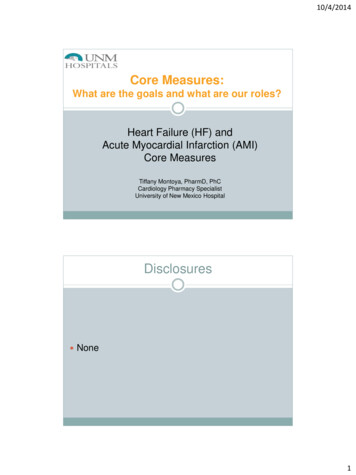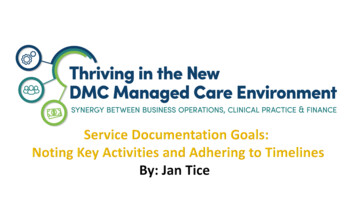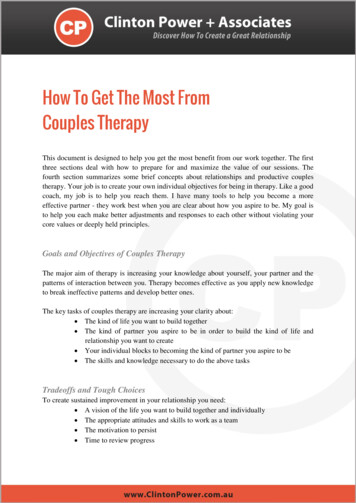
Transcription
How To Get The Most From Couples TherapyThis document is designed to help you get the most benefit fromour work together. The first three sections deal with how to preparefor and maximize the value of our sessions. The fourth sectionsummarizes some brief concepts about relationships and productivecouples therapy. Your job is to create your own individual objectivesfor being in therapy. Like a good coach, my job is to help you reachthem. I have many tools to help you become a more effectivepartner - they work best when you are clear about how you aspireto be. My goal is to help you each make better adjustments andresponses to each other without violating your core values or deeplyheld principles.Goals and Objectives of Couples TherapyThe major aim of therapy is increasing your knowledge aboutyourself, your partner and the patterns of interaction between you.Therapy becomes effective as you apply new knowledge to breakineffective patterns and develop better ones.The key tasks of couples therapy are increasing your clarity about: The kind of life you want to build together The kind of partner you aspire to be in order to build the kind oflife and relationship you want to create Your individual blocks to becoming the kind of partner you aspireto be The skills and knowledge necessary to do the above tasksTradeoffs and Tough ChoicesTo create sustained improvement in your relationship you need: A vision of the life you want to build together and individually The appropriate attitudes and skills to work as a team The motivation to persist Time to review progressTo create the relationship you really desire, there will be somedifficult tradeoffs and tough choices for each person. The firsttradeoff will be time. It simply takes time to create a relationshipthat flourishes: time to be together, time to be with family, time toplay, coordinate, nurture, relax, hang out and plan. This time willencroach on some other valuable areas – your personal orprofessional time.The second compromise is comfort. That means emotional comfort,like going out on a limb to try novel ways of thinking or doing
things, listening and being curious instead of butting in, speaking upinstead of becoming resentfully compliant or withdrawing.At the beginning, there will be emotional risk taking action, but youwill never explore different worlds if you always keep sight of theshoreline. In addition, few people are emotionally comfortable beingconfronted with how they don’t live their values or being confrontedwith the consequences of their actions.The other comfort that will be challenged is energy comfort. Itsimply takes effort to sustain improvement over time - stayingconscious of making a difference over time - remembering to bemore respectful, more giving, more appreciative etc. It takes effortto remember and act.The other effort is even more difficult for some people - that isimproving their reaction to problems. For example, if one person ishypersensitive to criticism, and his/her partner is hypersensitive tofeeling ignored, it will take effort to improve their sensitivity insteadof hoping the partner will stop ignoring or criticizing. In all theseareas, there is generally a conflict between short-term gratificationand the long-term goal of creating a satisfying relationship. Theblunt reality is that, in an interdependent relationship, effort isrequired on the part of each person to make a sustainedimprovement. It is like pairs figure skating – one person cannot domost of the work and still create an exceptional team.How to Maximize the Value from your Couples TherapySessionsA common yet unproductive pattern in couples therapy is makingthe focus be whatever problem happens to be on someone’s mindat the moment. This is a reactive (and mostly ineffective) approachto working things through.The second unproductive pattern is showing up with each personsaying, “I don’t know what to talk about, do you?” While this blankslate approach may open some interesting doors, it is a hit or missprocess.The third common unproductive pattern is discussing whatever fightyou are in at the moment or whatever fight you had since the lastmeeting. Discussing these fights/arguments without a largercontext of what you wish to learn from the experience is often anexercise in spinning your wheels. Over time, repeating thesepatterns will lead to the plaintive question, “Are we gettinganywhere?” A more powerful approach to your couples therapysessions is for each person to do the following before each session:
1. Reflect on your objectives for being in therapy.2. Think about your next step that supports or relates to your largerobjectives for the kind of relationship you wish to create, or thepartner you aspire to become. This reflection takes some effort. Yetfew people would call an important meeting and then say, “Well, Idon’t have anything to bring up, does anyone else have anything ontheir agenda?” Your preparation will pay high dividends.Important Concepts for Couples Therapy and RelationshipsThe following ideas can help identify areas of focus in our workand/or stimulate discussion between you and your partner betweenmeetings. If you periodically review this list, you will discover thatyour reflections and associations will change over time. So pleaserevisit this list often, it will help you keep focus during our work.Attitude is KeyWhen it comes to improving your relationship, your attitude towardchange is more important than what action to take. What to do andhow to do it can often be easily identified. The real challenge is whyyou don’t do it. How to think differently about a problem is oftenmore effective than just trying to figure out what action to take.Your partner is quite limited in his/her ability to respond to you. Youare quite limited in your ability to respond to your partner.Accepting that is a huge step into maturity. The definite possibilityexists that you have some flawed assumptions about your partner’smotives. And that he/she has some flawed assumptions aboutyours. The problem is, most of the time we don’t want to believethose assumptions are flawed.Focus on Changing Yourself Rather than Your PartnerCouples therapy works best if you have more goals for yourself thanfor your partner. I am at my best when I help you reach objectivesyou set for yourself. Problems occur when reality departs sharplyfrom our expectations, hopes, desires and concerns. It’s humannature to try and change one’s partner instead of adjusting ourexpectations. This aspect of human nature is what keeps therapistsin business. The hardest part of couples therapy is accepting youwill need to improve your response to a problem (how you thinkabout it, feel about it, or what to do about it). Very few people wantto focus on improving their response. It’s more common to build astrong case for why the other should do the improving. You can’t
change your partner. Your partner can’t change you. You caninfluence each other, but that doesn’t mean you can change eachother. Becoming a more effective partner is the most efficient wayto change a relationship. It's easy to be considerate and loving toyour partner when the vistas are magnificent, the sun is shining andbreezes are gentle. But when it gets bone chilling cold, you’rehungry and tired, and your partner is whining and sniveling abouthow you got them into this mess, that's when you get tested. Yourleadership and your character get tested. You can join the fingerpointing or become how you aspire to become. Nothing isimpossible for the person who doesn’t have to do it. Fear lets youknow you’re not prepared. If you view fear in that mode, it becomesa signal to prepare the best you can. You can learn a lot aboutyourself by understanding what annoys you and how you handle it.The more you believe your partner should be different, the lessinitiative you will take to change the patterns between you.Zen Aspects of Couples Therapy (Some Contradictions)All major goals have built in contradictions, for example, speak upor keep the peace. All significant growth comes fromdisagreements, dissatisfaction with the current status, or a strivingto make things better. Paradoxically, accepting that conflictproduces growth and learning to manage inevitable disagreementsis the key to more harmonious relationships. It’s not what you say.It’s what they hear. Solutions, no matter how perfect, set the stagefor new problems.Tough QuestionsAsking good questions - of yourself and your partner - helps youuncover causes beneath causes. In a strong disagreement, do youreally believe your partner is entitled to their opinion? Under duress,do you have the courage and tenacity to seek your partner’s realityand the courage to express your reality when the stakes are high?Why is it important to let your partner know what you think, feeland are concerned about? (Because they really can’t appreciatewhat they don’t understand.) What is the price your partner willhave to pay to improve their response to you? How much do youcare about the price they will have to pay? (Everything has a priceand we always pay it.) Can you legitimately expect your partner totreat you better than you treat him/her? Can you legitimatelyexpect your partner to treat you better than you treat yourself? Ifyou want your partner to change, do you think about what you cando to make it easier? When a problem shows up, it’s natural to
think “What should I do about it?” A much more productive questionis, “How do aspire to be in this situation?”The Importance of CommunicationThe three most important qualities for effective communication arerespect, openness and persistence. Good communication is muchmore difficult than most people want to believe. Effectivenegotiation is even harder. A couple’s vision emerges from aprocess of reflection and inquiry. It requires both people to speakfrom the heart about what really matters to each. We are allresponsible for how we express ourselves, no matter how otherstreat us. Communication is the number one presenting problem incouples counselling. Effective communication means you need topay attention to: Managing unruly emotions, such as anger that is too intense How you are communicating – whining, blaming, being vague,etc. What you want from your partner during the discussion What the problem symbolizes to you The outcome you want from the discussion Your partner’s major concerns How you can help your partner become more responsive to you The beliefs and attitudes you have about the problemNo wonder good communication is so hardSome Final Thoughts You can’t create a flourishing relationship by only fixing what’swrong. But it’s a start.Grace under pressure does not spring full-grown even withthe best of intentions - practice, practice and more practice.Practice the right things and you will get thereLove is destroyed when self-interest dominatesIf you don’t know what you feel in important areas of yourrelationship, it is like playing high stakes poker when you seeonly half your cards. You will make a lot of dumb playsThe possibility exists that we choose partners we need butdon’t necessarily wantTo get to the bottom of a problem often means you firstaccept how complex it isTrust is the foundational building block of a flourishingrelationship. You create trust by doing what you say you willdo
It’s impossible to be in a highly inter-dependent relationshipwithout ever being judgmental or being judged. If you striveto always feel emotionally safe in your relationship and get it,you will pay the price by becoming dull. If neither of you everrocks the boat, you will end up with a dull relationship Knowledge is not power. Only knowledge that is applied ispowerMost of the ineffective things we do in relationships fall into just afew categories: Blame or attempt to dominate Disengage/withdraw Resentful compliance Whine Denial or confusionThese are the normal emotional reactions to feeling a threat or highstress. Improving your relationship means better management ofthese reactions. Everything you do works for some part of you,even if other parts of you don’t like it. Everything you do that takesa sustained effort is governed by three motivations: Avoid pain or discomfort The benefits involved Be a better person It’s also true for your partnerIf you are asking your partner to change something, sometimes it’sa good idea to ask if the change is consistent with how they aspireto be in that situation. Businesses and marriages fail for the samethree reasons. A failure to: Learn from the past Adapt to changing conditions Predict probable future problems and take actionEffective change requires insight plus action. Action without insightis thoughtless. Insight without action is passivity. If you want tocreate a win-win solution, you cannot hold a position that hascaused your partner to lose in the past.“To be a champ you have to believe in yourself when nobody elsewill.” (Sugar Ray Robinson, middleweight boxing champion,considered by many to be the best fighter in history, pound-forpound).Adapted from an article by Ellyn Bader, Ph.D. and Peter Pearson, Ph.D. of the couplesinstitute.com
Couples therapy works best if you have more goals for yourself than for your partner. I am at my best when I help you reach objectives you set for yourself. Problems occur when reality departs sharply from our expectations, hopes, desires and concerns. It’s human nature to try and change one’s partner instead of adjusting our expectations.File Size: 298KB
